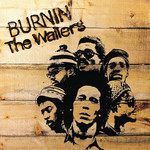
Burnin' (Half Speed Master Gatefold LP)
 $60.00
Out of Stock
$60.00
Out of Stock6+ weeks add to cart more by this artist
The Wailers
Burnin' (Half Speed Master Gatefold LP)
[ Universal / LP ]
Release Date: Friday 27 November 2020
This item is currently out of stock. It may take 6 or more weeks to obtain from when you place your order as this is a specialist product.
ABBEY ROAD'S world-renowned engineers have been cutting grooves into discs since the studios first opened their doors in 1931. This record was pressed from a master cut using a precision technique known as half-speed mastering.
The procedure requires the source master and the cutting lathe to run at half speed on a specially adapted Neumann VMS-80 lathe. This rare and specialised technique transforms difficult to cut high end frequencies into relatively easy to cut mid-range frequencies.
The result is a cut with excellent high frequency response and very solid and stable stereo images. In short, half-speed mastering produces a master of the highest quality that enables the pressing plant to produce a superlative record."
MILES SHOWELL
(MASTERING ENGINEER AT ABBEY ROAD STUDIOS)
The Wailers' fourth album overall, Burnin', was their second for Island Records, released only six months after its predecessor, Catch a Fire. Given that speed, it's not surprising that several tracks -- "Put It On," "Small Axe," and "Duppy Conqueror" -- are re-recordings of songs dating back a few years. But they fit in seamlessly with the newer material, matching its religious militancy and anthemic style. The confrontational nature of the group's message is apparent immediately in the opening track, "Get Up, Stand Up," as stirring a song as any that emerged from the American Civil Rights movement a decade before.
The Wailers are explicit in their call to violence, a complete reversal from their own 1960s "Simmer Down" philosophy. Here, on "Burnin' and Lootin'," they take issue with fellow Jamaican Jimmy Cliff's song of the previous year, "Many Rivers to Cross," asking impatiently, "How many rivers do we have to cross/Before we can talk to the boss?" "I Shot the Sheriff," the album's most celebrated song, which became a number one hit in the hands of Eric Clapton in 1974, claims self-defense, admits consequences ("If I am guilty I will pay"), and emphasizes the isolated nature of the killing ("I didn't shoot no deputy"), but its central image is violent. Such songs illuminated the desperation of poor Jamaican life, but they also looked forward to religious salvation, their themes accentuated by the compelling rhythms and the alternating vocals of the three singers.
Bob Marley was a first among equals, of course, and after this album his partners, Peter Tosh and Bunny Wailer, quit the group, which thereafter was renamed Bob Marley and the Wailers.
5 / 5 All Music Guide
Tracks:
SIDE A
1. Get Up, Stand Up
2. Hallelujah Time
3. I Shot The Sheriff
4. Burnin' And Lootin'
5. Put It On
SIDE B
6. Small Axe
7. Pass It On
8. Duppy Conqueror
9. One Foundation
10. Rasta Man Chant